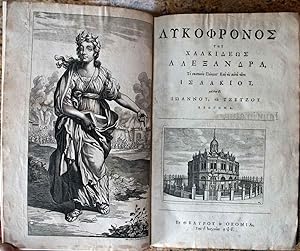lycophron joseph juste scaliger isaac (1 Ergebnisse)
Produktart
- Alle Product Types
- Bücher (1)
- Magazine & Zeitschriften
- Comics
- Noten
- Kunst, Grafik & Poster
- Fotografien
- Karten
- Manuskripte & Papierantiquitäten
Zustand
- Alle
- Neu
- Antiquarisch (1)
Einband
- alle Einbände
- Hardcover (1)
- Softcover
Weitere Eigenschaften
- Erstausgabe
- Signiert
- Schutzumschlag
- Angebotsfoto (1)
Gratisversand
- Versand nach USA gratis
Land des Verkäufers
Verkäuferbewertung
-
Lycophronis Chalcidensis Alexandra, obscurum poema. .
Verlag: E Theatro Shedoniano, Oxford, 1702
Anbieter: Rodger Friedman Rare Book Studio, ABAA, Tuxedo, NY, USA
Buckram. Zustand: Very Good. Second edition. Folio (32 cm); [16], 183, [1], [28], [6], 174, [18] pages, and full-page engraved frontispiece by Michael Burghers of a laurel-crowned Cassandra, standing before the walls of Troy in flames. Greek and Latin in parallel columns. Collation includes title page in Greek (with engraved vignette of the Sheldonian Theatre) and a second title page in Latin (with vignette of Oxford University's crest). Advertisement leaf at end. Bound in modern library buckram. Pages somewhat toned at edges, but text block is sturdy and without significant blemish. References: ESTC T107442; The Greek poets of the Hellenistic period (following the death of Alexander the Great in 323 BCE and lasting three hundred years until the establishment of the Roman Empire) have a reputation for indulging in an ornate and sometimes opaque style that we would later associate with Mannerist poets like Gongora or Marino. Lycophron's Alexandra (or Cassandra) may be the epitome of that style. Even Alexandrian scholars of the time referred to it as "the obscure poem." Wikipedia quotes a modern critic who says the Alexandra "may be the most illegible piece of classical literature, one which nobody can read without a proper commentary and which even then makes very difficult reading." That must be why in the opening line the poet says, "I will spell out everything clearly, whatever you ask, from the very beginning." The Wiki article continues, "The poem is evidently intended to display the writer's knowledge of obscure names and uncommon myths; it is full of unusual words of doubtful meaning gathered from the older poets, and long-winded compounds coined by the author. . It was very popular, and was read and commented on very frequently. Two explanatory paraphrases of the poem survive, and the collection of scholia by Isaac and John Tzetzes is very valuable." The Oxford edition by John Potter (later Archbishop of Canterbury) offered here includes the Tzetzes scholia, as well as an exuberant Latin version of the poem by Joseph Scaliger (first published in 1566, when Scaliger was 25 years old) and notes by Scaliger's friend Willem Canter. Potter first published the text in 1697, but only this second edition bears his dedicatory epistle to the German classical scholar (who taught at Utrecht) Johann Georg Graevius.


